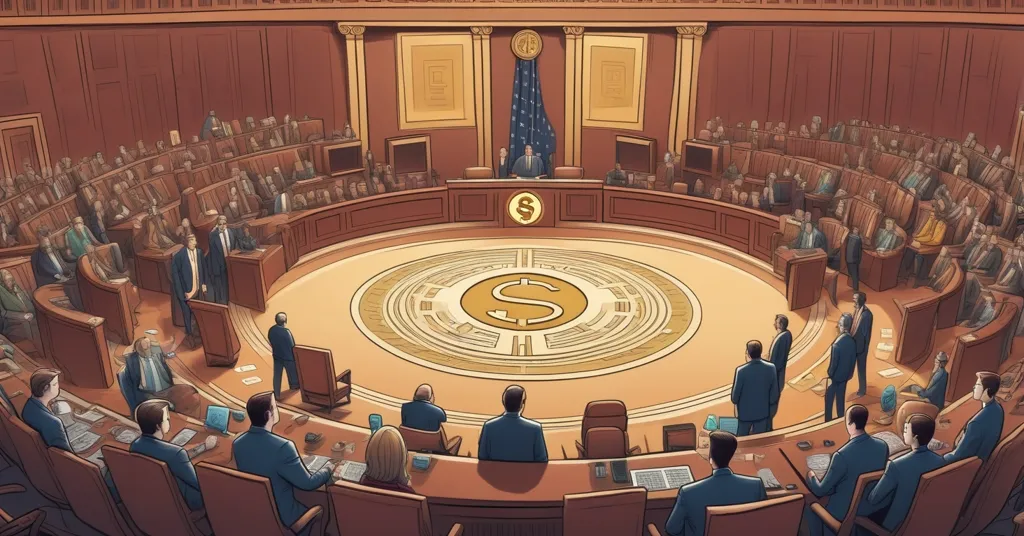Senate Rejects Stablecoin Bill Amid Partisan Clash and Trump Concerns

Senate Clash Stalls Stablecoin Legislation Progress
The U.S. Senate’s effort to establish a regulatory framework for stablecoins, digital currencies designed to have a stable value, faltered due to partisan tensions and concerns over former President Donald Trump’s crypto involvement. The Genius Act, which aimed to address the unclear legal status of the $246 billion stablecoin market, failed to secure the necessary 60 votes, with a tally of 48 in favor and 49 against. Despite this setback, the crypto industry remains hopeful for future legislative efforts, as the House of Representatives continues to work on defining regulatory jurisdictions for digital assets.
- Genius Act fails in Senate vote
- Partisan disagreements and Trump’s involvement cited
- Crypto industry remains hopeful for future legislation
The Senate’s vote on the Genius Act was a stark reminder of the political divide hindering cryptocurrency regulation. Senate Majority Leader John Thune voiced his frustration, stating,
I just don’t get it. Six versions of this bill were drafted to address concerns, yet Democrats are unwilling to move forward.
Conversely, Senator Elizabeth Warren, a key Democratic opponent, argued that the bill lacked essential consumer safeguards, saying,
The bill ignores basic protections that apply to every other financial product in America.
The elephant in the room during the Senate deliberations was Trump’s involvement in the digital asset sector. His $TRUMP meme coin and World Liberty Financial’s stablecoin have raised eyebrows, with the Wall Street Journal Editorial Board highlighting potential conflicts of interest. The connection between World Liberty Financial and Binance, a platform with a history of legal issues, underscores the broader implications of stablecoin regulation and the risks associated with unregulated entities.
Despite the Senate’s failure, the crypto industry remains optimistic. Kristin Smith, the outgoing CEO of the Blockchain Association, expressed hope for future bipartisan efforts, stating,
We look forward to next steps in this process and bipartisan discussion.
Similarly, Miller Whitehouse-Levine of the Solana Policy Institute remains confident, saying,
We are optimistic that bipartisan commitment to enact stablecoin legislation will get the Genius Act over the finish line.
Meanwhile, the House of Representatives is forging ahead with a digital asset market structure discussion draft led by Chairman French Hill and Chairman G.T. Thompson. This draft aims to provide regulatory clarity and protect consumers, offering a more detailed roadmap than the Genius Act. The joint hearing scheduled by the House Financial Services and Agriculture Subcommittees on digital assets signals ongoing legislative momentum.
The failure of the Genius Act highlights the challenges of navigating the “wild west of crypto,” but it’s not the end of the road. Companies like Coinbase, Ripple Labs, and Kraken are closely watching these developments, as the outcome will directly impact their operations. While the Senate’s vote was a blow, the continued efforts in the House suggest that the journey toward regulatory clarity is far from over.
Let’s not forget, Bitcoin and other cryptocurrencies thrive on decentralization and freedom. While stablecoin regulation is crucial, it’s also important to consider the potential risks of overregulation. A more hands-off approach might allow for greater innovation and disrupt the financial status quo, aligning with the principles of effective accelerationism (e/acc). However, striking the right balance between regulation and freedom remains a contentious issue.
Key Takeaways and Questions
- What was the purpose of the Genius Act?
The Genius Act aimed to create a federal regulatory framework for stablecoins, addressing their unclear legal status. - Why did the Genius Act fail to advance in the Senate?
The bill failed to secure the necessary 60 votes, with partisan tensions and concerns over consumer safeguards and Trump’s involvement in the crypto sector contributing to its failure. - What are the potential implications of the Genius Act’s failure for the crypto industry?
The failure underscores the challenges of regulating digital assets in a politically divided environment but also highlights the industry’s hope for future bipartisan efforts to achieve regulatory clarity. - How might the House of Representatives’ market structure bill impact the crypto industry?
If passed, the bill could define regulatory jurisdictions between the CFTC and SEC, providing the clarity needed for traditional institutions to enter the crypto space with confidence. - Which companies are closely monitoring developments in stablecoin regulation?
Companies like Coinbase, Ripple Labs, and Kraken are closely monitoring these developments, as they are directly impacted by stablecoin regulation.



